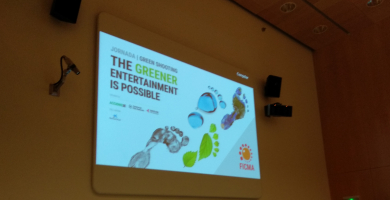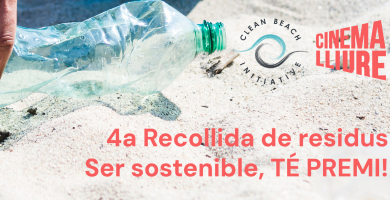
Sustainability in the world of entertainment by Emillie O’Brien
Speaker: Emillie O'Brien founder and CEO of Earth Angel

(Conference given in the framework of the Barcelona Environmental Film Festival (FICMA), held from November 2 to 8, 2018)
The summits on climate change do not stop providing us alarming information about the human footprint over the planet. Until not so many years ago, it seemed that the film industry did not have an environmental impact that had to be considered harmful.
Fortunately, this perception has changed throughout the years, and awareness has grown to make people believe that something has to be changed.
However, we lack of data to be able to properly measure the real impact, and there is a need to develop protocols for gathering the information which would lead us to get a better picture of the situation.
In this context, it is necessary for the public administrations, studios and producers to work together in order to entail this problem.
There are several initiatives that help to increase the consciousness of the footprint impact, such us: calculate the energy saving; create a "Green Oscar"; implement fiscal incentives for those productions taking care of the environment in their processes; and overall there is an crucial action not to be missed which is finding influential people that can help us to make spread the news.
Earth Angel works together with the city of New York on sustainable filming issues: training specialized producing assistants for film sets; providing recycling material; assessing and performing specific reports on this topic. Earth Angel understands that a change of paradigm must be made and therefore supports the implantation of the so called circular economy. These actions could be summarized in few lines: a need to evaluate and classify the materials used in a film shooting; optimization and handling of waste; looking for suppliers of sustainable material.
The industry raises reluctance to implement sustainable actions for various reasons: low economic efficiency; lots of bureaucracy; few reliable providers; a certain laziness and to implement concrete actions.
There are, however, a series of basic tips that are relatively easy to carry out. You can save energy by using reusable batteries, using electricity vehicles or trucks with solar panels, LED lights (the benefits of LED lamps are more like those of tungsten light); the impact of a production is reduced if we accommodate the personnel in hotels rather than motorhomes; we can also reuse construction materials; we can reduce the consumption of paper, plastic bottles and consumable material; give the leftover food from catering to associations that work with homelessness.
Finally, it is very important to communicate the actions that have been carried out, and what has been the result of our behavior.

Emillie O'Brien is founder and CEO of Earth Angel, located in New York. He studied at NYU's Tisch School of Arts where she graduated in Cinema & TV. Expert in the field of sustainability applied in the field of audiovisual production, her leadership in the sustainable actions of the production The Amazing Spider-Man 2 contributed to the fact that this production was recognized as the most sustainable blockbuster in the history of Sony-Pictures. She is the author of the Going-Green & Saving Green report: A Cost-Benefit Analysis of Sustainable Filmmaking (2014) for the American Producers Guild.
After the talk, we had the chance to speak with Emillie O'Brien who answered a few questions briefly:
What is the role of a Film Commission in green filming?
Film Commissions play an essential role as a crucible of all the parties involved in a filming activity. A good starting point for establishing sustainable policies implies the collaboration between the industry and the administration that regulates public space and is in charge of displaying city rules. In this context, it is necessary to establish a collaboration between both sides and it’s good for both to know the needs of each other.
What is the role of Earth Angel in relation with New York?
Earth Angel is a consulting company that works closely with the city of New York. We establish work plans together; we develop strategies to reduce the ecological footprint; and it tracks the action of some film productions if necessary.
Is there any plan to implement the use of city's energy network, to avoid fuel generators?
New York is still not on this path, but you need to explore the policy of some cities that are working on this topic, such as Vancouver.
How can the necessary data be compiled for a study?
It is a subject that has been raised many times and currently have tools such as "checklists" for tracking, but we do lack of indicators. At this moment, Earth Angel works with the data provided by the accounting department gives. Analyzing this data, we can imply the actions towards sustainability that has been implemented.









